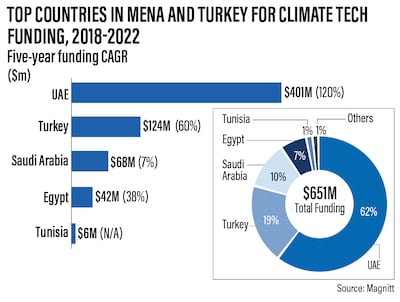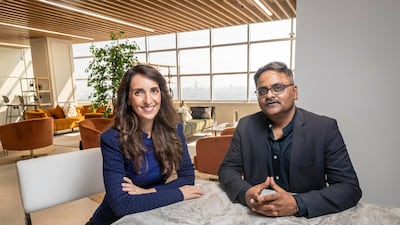Building back a greener economy and creating a sustainable world for future generations is what policymakers globally have pushed for since the world emerged from the depths of the pandemic-induced recession.
For oil and gas industry veteran Vivek Tripathi, this is not a mere policy statement, it is a call to action – and he has heeded it with a passion. Contributing to making the world a more sustainable place is something that is close to his heart.
“That's one thing that I have followed personally, and it is also as a mission for our company,” Mr Tripathi says.
The former Baker Hughes executive conceived the idea in 2020 and in 2021 built the foundations of Olive Gaea, a venture that helps businesses close their climate action gap.
With a chemical engineering degree as well as an MBA in oil and gas management, Mr Tripathi had a successful career working for major companies in India including Crisil, an S&P global Ratings company, and Cairn Oil and Gas.
He climbed the corporate ladder and ended up working as chief of staff to Indian billionaire Mukesh Ambani at his conglomerate Reliance Industries.
From Reliance, he moved on to a role in US energy company Baker Hughes, first in India and then the UAE, to lead the company’s regional sales and commercial operations.
With the world in lockdown and calls for building back better and more sustainably, Mr Tripathi saw the need for a regional climate technology company that could help businesses across the spectrum to boost their decarbonisation efforts.
He connected with Olive Gaea’s co-founder Jessica Scopacasa, an Italian citizen who has been helping firms in the region incorporate sustainable strategies into their corporate structure for more than a decade, on LinkedIn.
Their initial conversations were underpinned by their “like mindedness” and their urge to find a climate tech and sustainability solution for the regional market.
It was an ideal match, with Mr Tripathi’s background in the energy sector and Ms Scopacasa’s experience in sustainability strategies, and the duo put the moving parts of Olive Gaea together.
“I had been in the thick of things” and saw how customers in the energy industry particularly struggled with “the bigger problem of climate change”, Mr Tripathi says.
“All of this basically gave me enough impetus at that point to start thinking more holistically, and how the experience that I have gained in the energy sector can be utilised to deliver something which can have a much, much larger impact.”
Their differing backgrounds but common goal coalesced into Olive Gaea, a Mena-focused Sustainability as a Service (SaaS) platform whose footprint has spread as far away as India.
The company provides artificial intelligence-driven solutions that allow both government and private sector clients to reduce their carbon footprint.
Although there were several companies in the region providing corporate sector consultancy in terms of the sustainability practices, “we were the first movers here in this market”, Mr Tripathi says.
The company, licensed by the Dubai World Trade Centre, also help clients secure carbon credits.
Olive Gaea starts with assessing the carbon footprint of a business and then maps and monitors emissions across the value chain.
“And we just don't stop there,” he says. “The businesses [then] will be interested in understanding what can they do about it, and that's where the core of our support comes in … suggesting the right set of decarbonisation measures … to help them achieve their net-zero goals.”
The venture was initially funded by Mr Tripathi, with friends and family contributing about $100,000 to give the company “arms and legs”.
Last month, Olive Gaea announced $1 million in seed funding from Cornerstone Ventures, which the company said will help them launch “Zero by Olive Gaea”, an SaaS platform to tackle net zero and carbon management challenges.
As global regulatory frameworks expand and customer expectations for corporate responsibility rise, Olive Gaea's Zero fills a “crucial need for greenhouse gas emissions management and climate action disclosure in the Mena region”, the company said at the time.

Climate tech start-ups in the UAE attracted about two thirds of total funding from 2018 to 2022 to lead the burgeoning sector's growth in the Middle East, North Africa and Turkey region, start-up data platform Magnitt said.
About $401 million, equivalent to 62 per cent of the total regional investments of $651 million, went to companies based in the Emirates during the five-year period, its State of Climate Tech Venture Capital Report said.
Funding for UAE climate tech start-ups grew at a compound annual growth rate of 120 per cent in the five-year period, which was double that of second-place Turkey's 60 per cent.
The momentum has continued into 2023, with 30 transactions and investments of $40 million recorded in the first half of this year, Magnitt said.
Olive Gaea's latest funding round will also help the company expand its footprint in markets across the GCC. It plans to begin its expansion drive with an office in Saudi Arabia, the largest Arab economy, where it is already serving clients, Mr Tripathi says.
“Physical presence in Saudi is the next move that we are going to make with the funding,” he says. “Beyond GCC and India as such, we are aiming [for] the US, to have a set-up in California.”
The company is already preparing for its next round of financing and plans to secure series A growth funding of at least $8 million within the next eight to 12 months.
“In the past month, we had made a couple of strong pitches and we are seeing a good amount of interest as well,” he says.
The list of Olive Gaea clients has grown steadily since the beginning of 2022 to include financial institutions, e-commerce businesses, large property developers, construction companies and regional sovereign wealth funds.
It is currently serving about 30 clients in the UAE, Saudi Arabia and India and has a “clear pathway” to expand its customer base to about 250 in the short to medium term, Mr Tripathi says.
The company earns revenue through subscriptions as well as consultancy services it provides and had a “good amount of revenue traction” last year, he says.
“The biggest leap that we had taken was in the start of the year itself … where we have almost quadrupled the sort of revenues that we were making in 2022. That's the sort of growth and trajectory that we are keeping up.”

Q&A with Olive Gaea co-founder and chief executive Vivek Tripathi
Who is your role model?
There are many people who have inspired me all through my life but Pat Brown stands out. He is the founder of food technology start-up Impossible Foods, which leads the space of plant-based meat. He comes with a stellar academic background as a professor of biotech at Stanford and a pioneer in DNA mapping. What amazes me is his razor-sharp vision to bring in a solution that can solve the problem of about 15 per cent of global emissions – caused by livestock farming – and free up 33 per cent of land used for raising livestock by catering plant-based meat to 86 per cent of the global population.
What is your mantra of success?
For us, it has been all about being resilient whilst maintaining consistent agility. We started at the peak of the pandemic, survived the challenge, and yet kept growing our connection with businesses in the region by continuously learning and evolving from our mistakes. This is the testimony of our proven approach.
Are you a risk-taker or a cautious entrepreneur?
I am a firm believer in the saying that the “biggest risk is not taking any risk and a sure shot way to failure”. For me, calibrated risk-taking is very integral for the success of any business. However, we do this by evaluating every potential risk from its impact and mitigation perspective.
What successful start-ups do you wish you had started and why?
There is a long list of such start-ups – from LinkedIn, Facebook, Tesla, Amazon and all other usual suspects, which I wish to be part of. Their success reinforces the belief that innovation, coupled with a commitment to positive change, can truly transform the world.
But I hear that phrase by Peter Thiel that the next Bill Gates will not start an operating system and the next Larry Page would not start a search engine. I believe the world problems are evolving and building a successful start-up needs an entrepreneur to get to the core of the issue which are faced by customers and help solve them with an easy and innovative solution.
We all know that climate change today is the biggest problem that humankind has ever faced. We at Olive Gaea are developing innovative solutions for automating decarbonisation and guiding businesses toward net-zero goals. This is not just a business endeavour; it's our passion, our mission.
Where do you see Olive Gaea in five years from now?
In the next five years, I envision Olive Gaea as a global leader in climate technology, playing a vital role in helping corporations worldwide achieve their net-zero goals. I see our platform Zero, which automates decarbonisation and guides businesses through their sustainability journeys, becoming an integral part of corporate strategies across industries.
What would you change if you had to do it all over again?
Given a chance, I would pivot earlier to develop a stronger focus on the business-to-business landscape instead of spreading ourselves thin over multiple customer segments. Though it has offered us our own set of learnings, our collaboration with businesses, especially those committed to achieving net-zero goals, has proved pivotal in our success.
What new skills have you learnt with launching Olive Gaea?
Launching Olive Gaea has been a transformative experience. It has allowed me to enhance my skills in innovation, team leadership and effective communication. I have also learnt to navigate the complexities of sustainable technology, honed my financial management skills and most of all, developed a sense for identifying market opportunities. I have also learnt how to be agile and adaptive – really the essential skill in the ever-evolving landscape of climate technology.
What is your advice for budding entrepreneurs?
My advice is to believe in your vision passionately but remain adaptable. Embrace failures as learning opportunities, seek mentorship from experienced individuals and surround yourself with a dedicated and diverse team. Staying committed to making a positive impact is important, as businesses with a purpose-driven focus have the potential to create lasting change.











